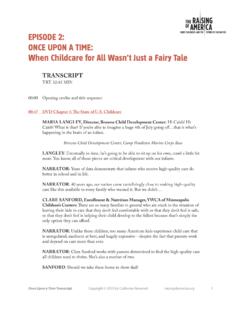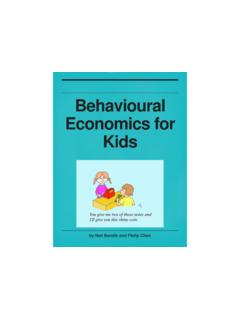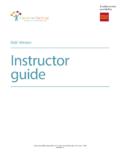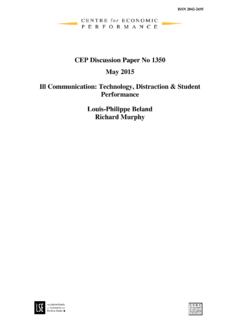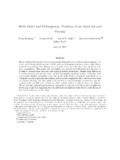Transcription of EPISODE 3: ARE WE CRAZY ABOUT OUR KIDS?
1 EPISODE 3: ARE WE CRAZY ABOUT OUR kids ? Discussion Guide EPISODE 3: ARE WE CRAZY ABOUT OUR kids ? Discussion Guide The Raising of America: Early Childhood and the Future of Our Nation The Raising of America is an ambitious documentary series and public engagement campaign that seeks to reframe the way we look at early child health and development. It illustrates how a strong start for all our kids leads not only to better individual life course outcomes (learning, earning and physical and mental health) but also to a healthier, safer, better educated, more prosperous and equitable nation. Learn more ABOUT each EPISODE in the series at : Ep 1: The Raising of America Ep 2: Once Upon a Time Ep 3: Are We CRAZY ABOUT Our kids ? Ep 4: Wounded Places Ep 5: DNA is Not Destiny View our 400+ partner organizations at and join the campaign ( ) to change the conversation ABOUT what we can and should do to give all our kids a strong start.
2 This guide was developed by Faith Rogow, PhD, Insighters Education Consulting with input from Larry Adelman and Rachel Poulain at California Newsreel. Content from this guide may be reproduced without permission provided the following credit is included: Taken from THE RAISING OF AMERICA Discussion Guide. Copyright 2015 California Newsreel.. Copyright 2015 California Newsreel In This Guide A) ABOUT THE FILM. Synopsis .. 1. Themes & Film Chapters .. 3. Statistics from the Film .. 4. Film Participants .. 6. B) DISCUSSING THE FILM. 1. Facilitating the Discussion .. 7. 2. Pre-Viewing Activities .. 8. 3. Post-Viewing Discussions .. 11. a) Opening Prompts .. 11. b) Comprehension Check-ins .. 12. c) Framing the Issues .. 13. d) Examining the Evidence .. 15. e) Understanding Resistance .. 17. f ) Understanding Government (In)Action .. 19. g) Summing Up .. 21. 4. Moving to Action .. 22. C) BACKGROUND & RESOURCES.
3 Parental Leave Policy .. 24. What Do We Mean By Quality? .. 25. Economists and Their Research .. 27. A. ABOUT . THE FILM. Are We CRAZY ABOUT Our kids ? SYNOPSIS. EPISODE 3: Are We CRAZY ABOUT Our kids ? (32 minutes) is part of the documentary series The Raising of America: Early Childhood and the Future of Our Nation. This EPISODE asks: What are the economic benefits reaped by investing in affordable, high-quality early care and preschool? Science demonstrates that a child's experiences during the earliest years are vital to building the foundation for life-long success in school and in life. Now economists are studying the costs and benefits of high-quality child development programs. And they're worried. Not because we're spending too much but because we're spending too little where it matters most. With guidance from acclaimed economists including Nobel prize winner James Heckman, former Minneapolis Federal Reserve senior vice president Arthur Rolnick, and the economist and investment banker Robert Dugger Are We CRAZY ABOUT Our kids ?
4 Looks at the research around high- quality early programs. The field's classic investigations HighScope's Perry Preschool, Carolina's Abecedarian Project and Chicago's Parent-Child Center Study are combined with more recent examples from Qu bec and Salt Lake City, Utah. Here is what they found: investments in high-quality child care and preschool pays for itself in many ways and many times over, yielding huge individual and societal benefits. Children who received high-quality early care and education were more likely to graduate high school and college, get better jobs and contribute more in taxes. They were less likely to abuse substances, go to jail, be unemployed, or be tracked into special education classes. Studies show that high-quality programs return to society $6 or more for every dollar invested over time. DISCUSSION GUIDE: Are We CRAZY ABOUT Our kids ? 2015 California Newsreel 1.
5 A. ABOUT . THE FILM. And parents with affordable, high-quality child care options did better, too. In Qu bec, child poverty rates went from the highest in Canada to the lowest after the province started subsidizing infant and toddler care and preschool for any family who wanted it. The tuition: $7 a day. Access to affordable care made it possible for more mothers to work, which increased family income. Despite the proven benefits, high-quality child care is hard to find and unaffordable for most families here in the Less than 10% of child care facilities are even accredited, and center-based care can cost $12,000 a year or more. Subsidies and local and federally-funded programs like Head Start and Early Head Start meet only a fraction of the need. Why aren't we doing more? The film points out that states and cities do have money. They spent more than $80 billion handing out tax breaks and other incentives to corporations in 2011 alone, competing to lure each other's companies and jobs.
6 But, as former Fed economist Arthur Rolnick points out, that's a zero sum game: for the nation as a whole, not one new job is created. But some places are investing in preschool programs, including a Salt Lake City School District. Their preschool program reduced the number of students assigned to special education by more than 90%. Those savings alone paid for the program. Tracked now through fifth grade, low-income students who attended preschool had almost closed the achievement gap between their affluent peers. The evidence is so compelling it leaves us to wonder what is preventing the from investing more in its youngest children and what are we willing to do ABOUT it. How CRAZY are we ABOUT our kids ? DISCUSSION GUIDE: Are We CRAZY ABOUT Our kids ? 2015 California Newsreel 2. A. ABOUT . THE FILM. THEMES. Are We CRAZY ABOUT Our kids ? is appropriate for audiences interested in: Achievement gap Granite City School District Anti-poverty initiatives Human capital development Carolina Abecedarian Project Labor issues Chicago Parent-Child Center Study Parental leave policies Child care programs Perry Preschool Study (HighScope).
7 Child care subsidies Preschool and pre-K. Child development Public health Crime prevention Qu bec Early childhood education Racial equity Economic development Social welfare Economic equity Socioeconomic class Economic justice Special education Education Stratification Feminism Women in the workforce FILM CHAPTERS. 1. 00:00 Prologue, Economists Ponder Child Development: Why Start Early? 2. 03:49 First Happy Returns: The Perry Preschool Studies - Better Outcomes, Lower Social Costs 3. 07:24 Qu bec Learns from the : Abecedarian and Chicago Parent-Child Center Studies 4. 10:26 Qu bec Is CRAZY ABOUT Its kids ! : Reducing Poverty by Enacting Afford- able Universal Early Care 5. 18:02 Subverting Our Own Future? The Lags Behind 6. 23:17 Closing the Achievement Gap in Utah: Are We CRAZY ABOUT Our kids ? DISCUSSION GUIDE: Are We CRAZY ABOUT Our kids ? 2015 California Newsreel 3. A. ABOUT . THE FILM.
8 STATISTICS FROM THE FILM. Outcomes for Children Compared to their peers, children in the high-quality child care programs studied were: Less likely to need special education services More likely to be literate by the sixth grade More likely to graduate high school Four times as likely to graduate college More likely to be employed More likely to have high-skill jobs and contribute more in taxes 50% less likely to commit a crime Economic Return According to studies of Perry Preschool and other programs by Nobel economist James Heckman, there is a 7-10% per year return over the lifetime of each child for each dollar invested in early interventions. Other studies conclude a return of $6 to $17 for every dollar invested in high-quality programs as a result of better education, increased productivity and decreased social costs. In dollar terms, the Chicago Parent-Child Center and Abecederian studies calculated a return to society of $84,000 and $100,000 respectively after the costs of the programs were subtracted.
9 In Quebec, the government gets back $ from increased tax revenues alone for every $1 it invests in its child care system because so many more mothers (and some fathers) are now able to work. In 2011, states and municipalities gave corporations $80 billion in tax breaks and other incentives ( infrastructure, buildings, waivers of zoning and regulations) in a competition to lure each other's companies. That's enough money to fund a $20,000/year childcare experience for 4 million children. DISCUSSION GUIDE: Are We CRAZY ABOUT Our kids ? 2015 California Newsreel 4. A. ABOUT . THE FILM. Results from the Granite School District After two years in Granite School District's (Salt Lake City) high-quality preschool program, only 11 of the 238 mostly low-income children whose original entry tests suggested they would be directed to special education . were placed in special ed. The rest were mainstreamed.
10 The Granite preschool program saved Utah $ million and saved the federal government $ million in special education costs alone. The mainstreamed children were tracked through fifth grade at the time of filming. Their performance indicated that Granite School District's early childhood initiative reduced the gap between low-income schools and high-income schools from 22 points to 5 points and closed the math gap completely. THE FILM'S TITLE. The title Are We CRAZY ABOUT Our kids ? was inspired by Qu bec's initial report recommending universal early care and education, Un Qu bec Fou des Ses Enfants (Qu bec is CRAZY for Its kids !). The report's title sent the message that Qu bec should take an impassioned stand for children and it captured the imaginations of early childhood advocates, galvanizing them to push for solutions that prioritized children. We have to ask ourselves why we in the appear to be sabotaging our own future by not making these investments a national priority.
